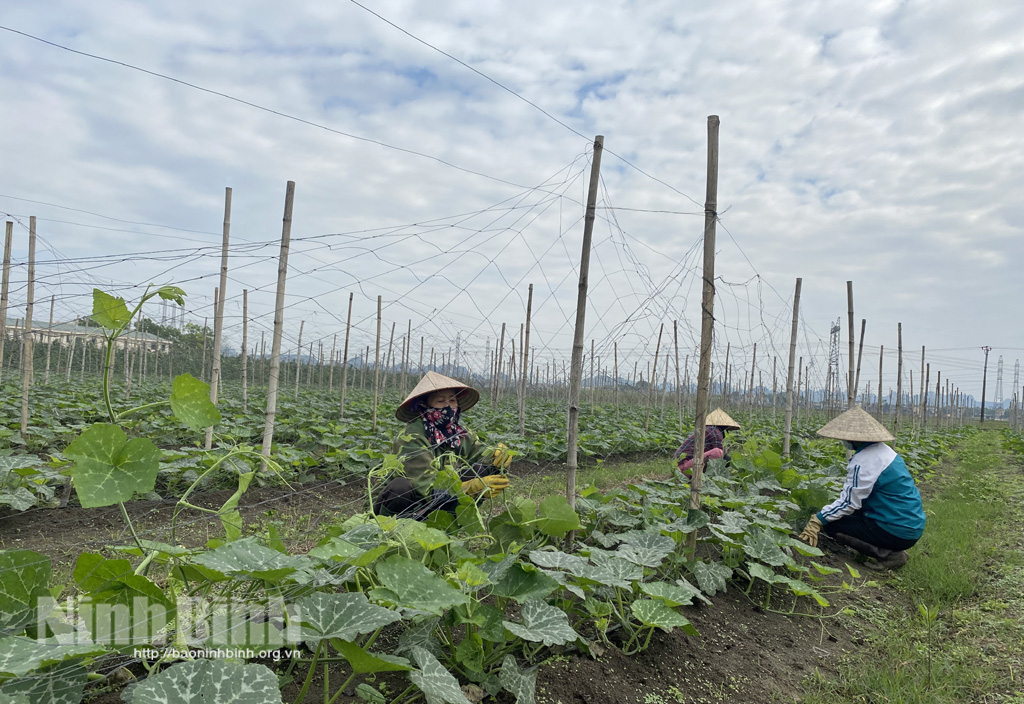Ninh Binh expands organic agricultural production

The move has helped to add more values and raising competitiveness of agricultural products in the market, meeting the higher demand of consumers.
Coming to the 18-ha farm of Dong Xanh Cooperative in Dong Phong commune, Nho Quan district, visitors can see the green color of numerous kinds of vegetables such as tomato, eggplant, cucumber, green beans and pumpkins.
They are all provided with organic ferilizers plus with automatic water pumping system. Farmers use organic pesticides to take care of vegetables.
Nguyen Van Tam, Director of the Dong Xanh Cooperative, said: "Our agricultural products are provided with organic fertilizers. They are regularly supplied to agencies and sectors in Hanoi with the selling price being twice higher than that of the market."
Organic production has created distinctive quality for the cooperative's agricultural products, thus helping its brand name to be recognised in the market.
Currently, the cooperative is supplying 10 - 12 tonnes of vegetables each day with the stable price for certain consumers.
There are some other cooperatives in the province which have successfully implemented the organic production such as Chrysanthemum farming of Riti Cooperative; vegetable and fruit farming of Chan Dat Farm Cooperative (Nho Quan district); and some glasshouse vegetable production models in Gia Hoa and Gia Thang communes of Gia Vien district; Yen Thinh and Khanh Cu communes of Yen Mo district. Many famers gradually use organic fertilizers in planting fruit trees as well.
According to the Department of Agricultural and Rural development, organic agricultural production is the agriculture sector's main goal. In order to implement the Government's project on developing organic agriculture in the period 2020-2030, the department has piloted the farming of high-quality 'Hat cau' sticky rice since 2018. At the same time, the department issued documents guiding organic agricultural production practices.
As a result, by the end of 2021, localities in the province have expanded the area of organic rice farming to over 1,000 ha, mainly in Khanh Trung commune (Yen Khanh district), Quang Thien commune (Kim Son district), and Quynh Luu commune (Nho Quan district). The area of organic vegetable farming reached 50 ha.
As for the livestock industry, S-Garden Company (Gia Hoa commune, Gia Vien district) has applied EU organic standards in pig breeding with over 600 pigs, 40 sows, and 2,000 hens.
Organic agricultural production in the province has initially seen good results. However, the scale remains small, while farming models are spontaneous and fail to match potential.
Therefore, in order to create a breakthrough in organic agriculture, Ninh Binh needs to build planning schemes to develop concentrated organic farming areas which are suitable to natural conditions of each locality.
Besides, the province needs to step up the communication work to raise farmer's awareness, and provide organic farming techniques for farmers, cooperatives and agriculture cadres at all levels.
The agriculture sector needs to issue policies to assist organic agriculture in combination with applying scientific and technological advances; building brand names and promoting products; and encouraging farmers and cooperatives to invest in organic farming.
The Ministry of Agriculture and Rural Development should finalise its regulations on the process of production, certification, and management of organic products.
Heavier punishments must be imposed on those violating regulations related to brand names and origin of products to protect consumers and farmers.
Besides, cooperatives, farms and farmers are advised to choose suitable plant and animal varieties and seek stable markets for their products before expanding production.
Translated by Nguyen Thuy


